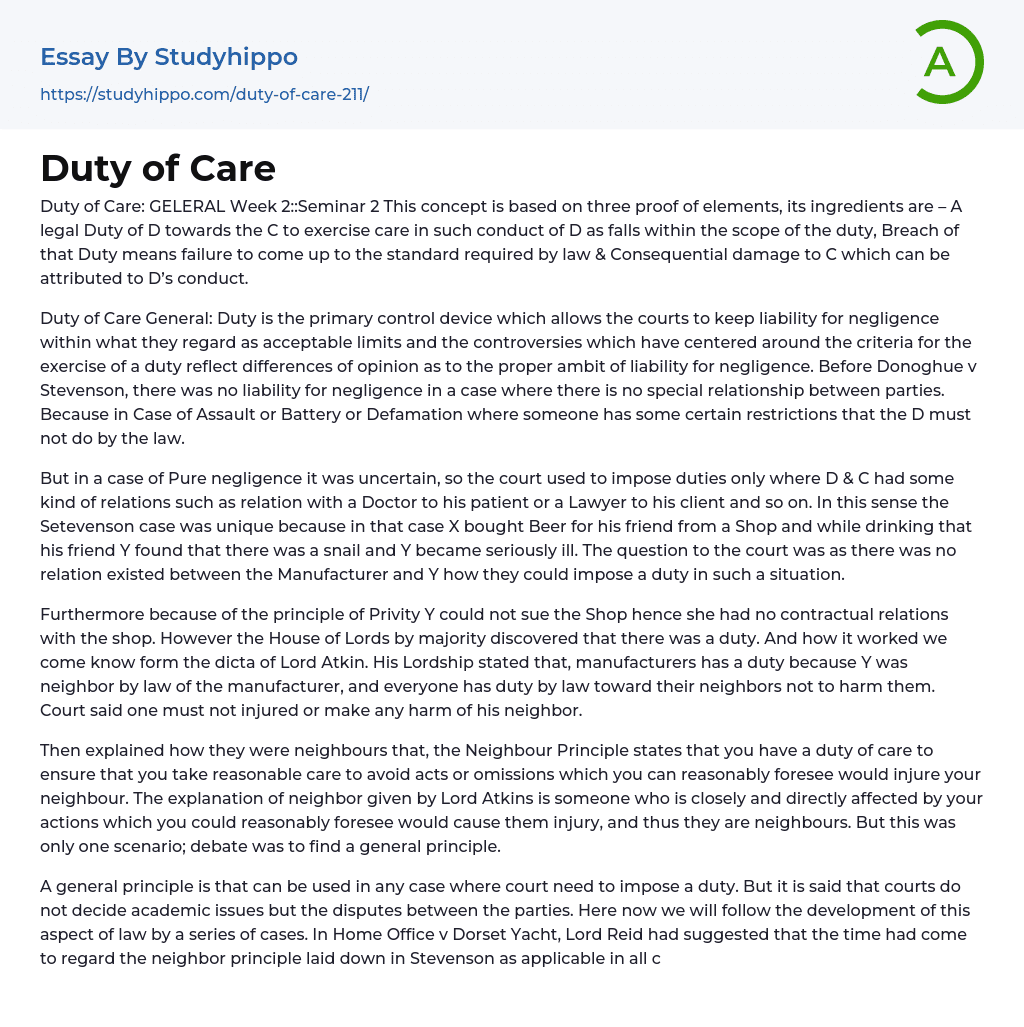Before we proceed to examine more about Duty of Care, it will be helpful to consider the way in which this concept is used by the courts. Duty of care can be broken down into two questions: rst one which is general and determined as a matter of law and policy; followed by one which is speci c and fact-based. 1st is this a case of the type to which the law of negligence is applicable 2nd,Was it foreseeable that this claimant would be harmed by the defendant’s act Comparing two signi ant negligence cases will illustrate what is meant by Question 1 and will introduce the important concept of policy.
In Rondel v Worsley (1969), the House of Lords con rmed that the barrister does not owe a duty of care in negligence to his clients in respect of his conduct of their case in court. This so-called ‘i
...mmunity’ was gradually extended over the years to include other matters closely connected to the preparation of the court case and, as solicitors gained rights of audience, to include all advocates.
Among the unanimous Law Lords’ justi ations for upholding the immunity were as follows: the advocate’s overriding duty lies not to his client but to the court; to permit actions in negligence might result in the effective retrial of a number of cases (‘collateral attacks’) with a consequential impact on con? dence in the administration of justice; there is a ‘cab-rank rule’ whereby the barrister is not at liberty to pick and choose which cases are accepted and, lastly, that the advocate must exercise his skill with complete independence, rather than in fear of a negligence claim.
Thirty
years later the issue of advocates’ immunity came before the House of Lords for reconsideration in Arthur JS Hall v Simons (2000). In view of the possibility that it might be decided to overrule their previous decision in Rondel, seven judges rather than the usual ve considered the case. This time, the consensus on the matter was different. In closely argued and detailed speeches, the Law Lords re? ected on the changes over the years in both professional culture and attitudes towards entitlements to remedies for wrongs and concluded that the advocates’ immunity from liability for the conduct of a court case must be abolished.
Lord Browne-Wilkinson reasoned as follows: First . . . , given the changes in society and in the law that have taken place since the decision in Rondel v Worsley . . . , it is appropriate to review the public policy decision that advocates enjoy immunity from liability for the negligent conduct of a case in court. Second, that the propriety of maintaining such immunity depends upon the balance between, on the one hand, the normal right of an individual to be compensated for a legal wrong done to him and, on the other, the advantages which accrue to the public interest from such immunity.
Third, that in relation to claims for immunity for an advocate in civil proceedings, such balance no longer shows suf cient public bene t as to justify the maintenance of the immunity of the advocate. Lord Browne-Wilkinson mentions the word policy. This can be de ned as the non-legal considerations; perhaps economic, social, or ethical, which a judge may employ in deciding the outcome of a
case. Policy plays a signi? cant part in the law of negligence, particularly in relation to duty of care. When deciding whether a given situation is one in which there should be a duty of care, the judge may be estimating whether an af mative decision would bring a ood of further similar claims which could overwhelm the courts or devalue legal credibility.
This is often referred to as the oodgates issue. Closely related to this is the potential impact which a decision might have on the insurance industry in the future and it includes calculations about where it is most economically efficient for loss to lie. Recently judges have begun voicing concerns about the impact of negligence liability on socially bene cial activities such as school trips.
Policy may also include reference to other options available to the client for obtaining redress. McLachlin J in the Canadian Supreme Court described policy as meaning ‘pragmatic’ considerations. As demonstrated in Hall v Simons, in recent years judges have become more open about expressing their views on policy matters and this transparency has let u s know more about what lies behind their conclusions on the issue of duty of care.
One problem with the influence of policy considerations, however, is that it involves a degree of guesswork. How much detailed evidence would need to be presented to the court before it was possible to estimate accurately a decision’s likely future effect on, say, accident prevention? Thus we see that declarations of policy can be subjectively based, with judges differing on interpretations of what may be little more than informed guesswork. (Case diary: development)
- Organic Chemistry essays
- Acid essays
- Calcium essays
- Chemical Bond essays
- Chemical Reaction essays
- Chromatography essays
- Ethanol essays
- Hydrogen essays
- Periodic Table essays
- Titration essays
- Chemical reactions essays
- Osmosis essays
- Carbohydrate essays
- Carbon essays
- Ph essays
- Diffusion essays
- Copper essays
- Salt essays
- Concentration essays
- Sodium essays
- Distillation essays
- Amylase essays
- Magnesium essays
- Acid Rain essays
- Jurisprudence essays
- Social Injustice essays
- Juvenile Justice essays
- Agriculture essays
- Albert einstein essays
- Animals essays
- Archaeology essays
- Bear essays
- Biology essays
- Birds essays
- Butterfly essays
- Cat essays
- Charles Darwin essays
- Chemistry essays
- Dinosaur essays
- Discovery essays
- Dolphin essays
- Elephant essays
- Eli Whitney essays
- Environmental Science essays
- Evolution essays
- Fish essays
- Genetics essays
- Horse essays
- Human Evolution essays
- Isaac Newton essays




